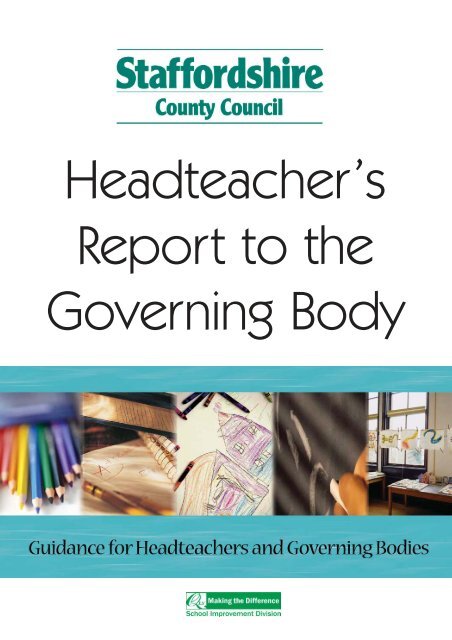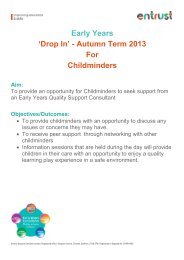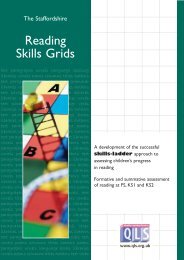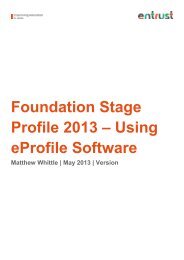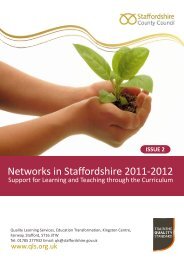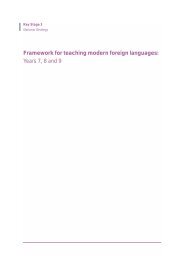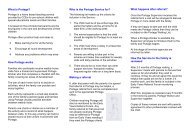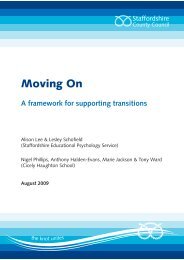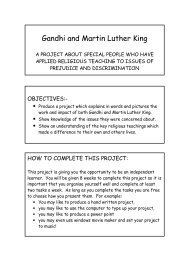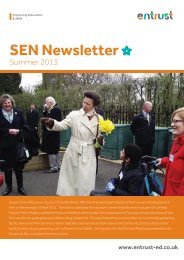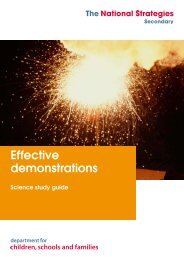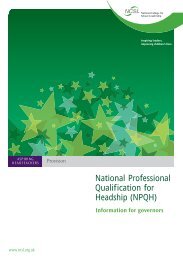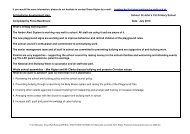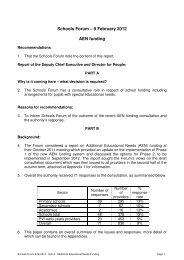Headteacher report guidance Staffordshire ... - the Essex Clerks
Headteacher report guidance Staffordshire ... - the Essex Clerks
Headteacher report guidance Staffordshire ... - the Essex Clerks
Create successful ePaper yourself
Turn your PDF publications into a flip-book with our unique Google optimized e-Paper software.
<strong>Headteacher</strong>’s<br />
Report to <strong>the</strong><br />
Governing Body
Contents<br />
Introduction 3<br />
Purposes of <strong>the</strong> <strong>Headteacher</strong>'s Report 4<br />
Frequency 5<br />
Style 6<br />
Confidentiality 6<br />
The general content of <strong>the</strong> <strong>report</strong> 7<br />
The content of <strong>the</strong> termly <strong>report</strong> 8<br />
Additional <strong>guidance</strong> for monitoring performance 10<br />
Example of a <strong>Headteacher</strong>'s Report 11<br />
Page<br />
Checklist 16<br />
2
Introduction<br />
This <strong>guidance</strong> has been produced by headteachers and governors in order to assist headteachers in<br />
writing <strong>report</strong>s for <strong>the</strong>ir governing body. It draws on advice and <strong>guidance</strong> provided by Devon County<br />
Council, Wokingham District Council, Education Leeds and Governornet and tailored to <strong>the</strong> needs of<br />
<strong>Staffordshire</strong> headteachers and governors.<br />
The 2006 Guide to <strong>the</strong> Law for School Governors<br />
states that '<strong>the</strong> headteacher must give <strong>the</strong> governing<br />
body any information requested by it for <strong>the</strong> purpose<br />
of <strong>the</strong> exercise of any of <strong>the</strong>ir functions'<br />
(Chap 13 par 76). The exact details in terms of content<br />
and format are a matter for <strong>the</strong> headteacher and <strong>the</strong><br />
governing body to determine. It is hoped that<br />
experienced headteachers will find this <strong>guidance</strong> useful<br />
in fine tuning <strong>the</strong>ir <strong>report</strong>s for <strong>the</strong> governing body and<br />
that new headteachers will find it invaluable in helping<br />
<strong>the</strong>m to write <strong>the</strong>ir first <strong>report</strong>.<br />
This <strong>guidance</strong> is not prescriptive or exhaustive<br />
but provides a framework for <strong>the</strong> <strong>report</strong> along with an<br />
example of good practice. Some headteachers may<br />
choose to have a number of staff contribute to <strong>the</strong><br />
<strong>report</strong> whereas o<strong>the</strong>rs will produce it <strong>the</strong>mselves.<br />
Within <strong>the</strong> National Standards for <strong>Headteacher</strong>s<br />
accountability is seen as essential for effective headship.<br />
'Head teachers account for <strong>the</strong> efficiency and<br />
effectiveness of <strong>the</strong> school to <strong>the</strong> governors<br />
and o<strong>the</strong>rs....'<br />
They:<br />
i. provide information, objective advice and support<br />
to <strong>the</strong> governing body to enable it to meet its<br />
responsibilities for securing effective teaching and<br />
learning and improved standards of achievements,<br />
and for achieving efficiency and value for money;<br />
ii. create and develop an organisation in which all<br />
staff recognise that <strong>the</strong>y are accountable for <strong>the</strong><br />
success of <strong>the</strong> school;<br />
iii. present a coherent and accurate account of <strong>the</strong><br />
school's performance in a form appropriate to a<br />
range of audiences, including governors, <strong>the</strong> local<br />
authority, <strong>the</strong> local community, OFSTED and<br />
o<strong>the</strong>rs, to enable <strong>the</strong>m to play <strong>the</strong>ir part effectively.<br />
Decisions delegated to <strong>the</strong> head by <strong>the</strong> governors are<br />
those which must be <strong>report</strong>ed by <strong>the</strong> headteacher to<br />
<strong>the</strong> governing body at <strong>the</strong>ir next meeting. It is important<br />
that all aspects of <strong>report</strong>s from <strong>the</strong> headteacher to <strong>the</strong><br />
governors are negotiated between <strong>the</strong> headteacher and<br />
<strong>the</strong> governing body. The following questions will assist<br />
<strong>the</strong> headteacher and governing body in making decisions<br />
about <strong>the</strong> style, format and content of <strong>the</strong> <strong>report</strong>.<br />
• What information do governors want/need<br />
specifically from <strong>the</strong> <strong>Headteacher</strong>'s Report?<br />
• How much detail do governors want?<br />
• How frequently should <strong>the</strong> <strong>report</strong> be prepared?<br />
• How much time should be spent discussing <strong>the</strong><br />
<strong>report</strong>?<br />
• What are <strong>the</strong> guidelines on confidentiality?<br />
• What are <strong>the</strong> expectations of how individual<br />
governors will use <strong>the</strong> <strong>report</strong>?<br />
3
Purposes of <strong>the</strong><br />
headteacher’s <strong>report</strong><br />
There are two main purposes for<br />
<strong>Headteacher</strong>s' <strong>report</strong>s to governors:<br />
Accountability<br />
Reports are <strong>the</strong> main vehicle for <strong>the</strong> headteacher to<br />
account to <strong>the</strong> governing body for:<br />
• <strong>the</strong> quality of education provided;<br />
• <strong>the</strong> development of pupils and staff and <strong>the</strong>ir<br />
mobility;<br />
• <strong>the</strong> standards attained and trends of<br />
performance;<br />
• <strong>the</strong> efficiency of <strong>the</strong> management of <strong>the</strong> school's<br />
resources and curriculum;<br />
• <strong>the</strong> progress made in implementing <strong>the</strong> school<br />
improvement plan and OFSTED action plan.<br />
Reports will <strong>the</strong>refore contain monitoring information<br />
on both performance and policy implementation.<br />
The information required to achieve this purpose is:<br />
a) that which enables governors to monitor<br />
performance, policy and delivery within a time<br />
scale. This is related to <strong>the</strong> success criteria<br />
contained ei<strong>the</strong>r within individual policies, action<br />
plans or within <strong>the</strong> improvement plan, or to<br />
performance indicators which <strong>the</strong> governing body<br />
and headteacher have agreed in advance.<br />
b) that which celebrates success. This may include<br />
examples of particular achievements of individuals<br />
or groups which are not necessarily related to<br />
school improvement plan targets or policy<br />
implementation.<br />
Assisting decision making<br />
Reports should provide governing bodies with <strong>the</strong><br />
information <strong>the</strong>y will need to make decisions or to<br />
formulate policy, for example, linking finance to <strong>the</strong><br />
resourcing of <strong>the</strong> curriculum.<br />
The information required to achieve this purpose may<br />
include <strong>the</strong> following:<br />
a) information on <strong>the</strong> school's own circumstances<br />
and how this compares and contrasts with that of<br />
similar schools, where appropriate, e.g. from<br />
comparative financial data to PANDAs;<br />
b) information on local and national legislation and<br />
policy developments which impact upon <strong>the</strong> life of<br />
<strong>the</strong> school;<br />
c) <strong>the</strong> headteacher's professional advice, or results<br />
of seeking advice from o<strong>the</strong>r sources, such as <strong>the</strong><br />
LA adviser, school improvement partner (SIP),<br />
o<strong>the</strong>r governors , etc.;<br />
d) information requiring future actions;<br />
e) any o<strong>the</strong>r information <strong>the</strong> governing body<br />
requires.<br />
In addition to <strong>the</strong> <strong>Headteacher</strong>'s Report <strong>the</strong> governing<br />
body should receive <strong>report</strong>s from:<br />
• Committees<br />
• Working groups<br />
• Members of staff, e.g. curriculum leaders<br />
•<br />
(when appropriate)<br />
Pupils, e.g. through verbal or written <strong>report</strong>s from<br />
<strong>the</strong> school council (when appropriate)<br />
• School improvement advisers<br />
• School improvement partners<br />
4
Frequency<br />
The Education (School Government) (Terms of<br />
Reference) Regulations 2000 state that<br />
'<strong>the</strong> headteacher shall <strong>report</strong> at least once every school<br />
year to <strong>the</strong> governing body on <strong>the</strong> progress made<br />
towards achieving <strong>the</strong> aims and objectives set and in<br />
particular towards meeting specific targets' (par 5.3).<br />
Custom and practice however, has led to a <strong>report</strong>,<br />
which is usually written once a term and updated<br />
verbally to <strong>the</strong> full governing body or to a committee.<br />
The termly <strong>report</strong> enables headteachers to focus on <strong>the</strong><br />
distinct aspects of <strong>the</strong> school for each term. For<br />
example, <strong>the</strong> autumn term can focus on pupil<br />
attainment following <strong>the</strong> publication of <strong>the</strong> PANDA<br />
<strong>report</strong>, <strong>the</strong> budget could be <strong>the</strong> focus for <strong>the</strong> spring<br />
term and <strong>the</strong> summer term is <strong>the</strong> time of <strong>the</strong> national<br />
tests. The focus of <strong>the</strong> <strong>report</strong> should reflect <strong>the</strong> issues<br />
of <strong>the</strong> term and should have a forward focus. If <strong>report</strong>s<br />
are a reflection on what has already happened<br />
governors are unable to influence/contribute to <strong>the</strong><br />
issues. With a <strong>report</strong> which is forward looking<br />
governors can both plan <strong>the</strong>ir work and better support<br />
<strong>the</strong> activities within <strong>the</strong> school. This in turn will enable<br />
<strong>the</strong> governors to monitor and evaluate more effectively<br />
and be better placed to make sound decisions. The<br />
<strong>Headteacher</strong>'s Report along with o<strong>the</strong>r <strong>report</strong>s can<br />
form <strong>the</strong> basis of <strong>the</strong> School Profile.<br />
The School Profile has three elements:<br />
• performance data pre-populated by <strong>the</strong> DfES;<br />
• a summary of <strong>the</strong> latest Ofsted <strong>report</strong>;<br />
• narrative sections written by <strong>the</strong> school.<br />
The narrative sections for <strong>the</strong> school to complete<br />
include <strong>the</strong> following headings:<br />
• What have been our successes this year?<br />
• What are we trying to improve?<br />
• How have our results changed over time?<br />
• How are we making sure that every child gets <strong>the</strong><br />
teaching to meet <strong>the</strong>ir individual needs?<br />
• How do we make sure our pupils are healthy,<br />
safe and well supported?<br />
• What have we done in response to Ofsted?<br />
• How are we working with parents and <strong>the</strong><br />
community?<br />
The narrative sections vary slightly in size, ranging from<br />
100 to 200 words. (A Guide to <strong>the</strong> Law for School<br />
Governors, 2006 chapter 13 par 26-27).<br />
5
Style<br />
Although headteachers and governors will have <strong>the</strong>ir<br />
own ideas about <strong>the</strong> style and format of <strong>the</strong> <strong>report</strong>,<br />
<strong>the</strong>re are certain characteristics that are recognised as<br />
good practice.<br />
a) The <strong>report</strong> should be well structured, set out with<br />
clearly numbered and /or headed paragraphs for<br />
ease of use and reference.<br />
b) Some information could be shown as charts or<br />
appendices, e.g. PANDA details, <strong>report</strong>s<br />
from advisers.<br />
c) Avoid <strong>the</strong> use of jargon and acronyms. If however<br />
<strong>the</strong>y are necessary <strong>the</strong>y should be explained at an<br />
appropriate place in <strong>the</strong> <strong>report</strong>.<br />
d) Use plain and lively language.<br />
e) The tone needs to be business-like, friendly yet in<br />
a formal way. Remember you are <strong>report</strong>ing to lay<br />
governors.<br />
f) Be positive and illustrate <strong>the</strong> school's<br />
achievements.<br />
g) Be frank and open as this encourages trust.<br />
h) Indicate clearly which items are (i) for information<br />
or consultation, (ii) for action, (iii) where a<br />
decision is required.<br />
The <strong>Headteacher</strong>'s Report should always be sent out to<br />
governors in advance of <strong>the</strong> meeting (at least 7 clear<br />
days) with <strong>the</strong> agenda papers. It's good practice to be<br />
one of <strong>the</strong> first agenda items so that <strong>the</strong>re is time to<br />
deal with matters arising from <strong>the</strong> <strong>report</strong>.<br />
Confidentiality<br />
Once <strong>the</strong> <strong>Headteacher</strong>'s Report is distributed to<br />
governors it enters <strong>the</strong> public domain and must be<br />
made available at <strong>the</strong> school to anyone wishing to read<br />
it. It is important that information is not included which<br />
identifies individuals in <strong>the</strong> school - ei<strong>the</strong>r pupils, parents<br />
or staff. It is recommended that in <strong>the</strong> annual discussion<br />
about <strong>the</strong> content of <strong>the</strong> <strong>report</strong> that governors are<br />
reminded about <strong>the</strong> need for confidentiality. This should<br />
include a reminder of <strong>the</strong> need to halt any discussion<br />
which is at risk of breaching <strong>the</strong> confidentiality rules.<br />
<strong>Headteacher</strong>s and governors may wish to consider<br />
whe<strong>the</strong>r <strong>the</strong> <strong>Headteacher</strong>'s Report should be shared<br />
with staff as it contains much information that may be of<br />
interest to <strong>the</strong>m. Confidential information should be<br />
written as separate statements and kept outside of <strong>the</strong><br />
<strong>Headteacher</strong>'s Report to protect all concerned but<br />
recognising <strong>the</strong> requirements of <strong>the</strong> Freedom of<br />
Information and Data Protection Acts. An alternative to<br />
making <strong>the</strong> <strong>Headteacher</strong>'s Report available to <strong>the</strong> staff<br />
may be <strong>the</strong> teacher governor preparing a short<br />
summary after <strong>the</strong> full governing body meeting which<br />
includes information about both <strong>the</strong> meeting and <strong>the</strong><br />
<strong>Headteacher</strong>'s Report.<br />
6
The general content<br />
of <strong>the</strong> <strong>report</strong><br />
Writing a <strong>Headteacher</strong>'s Report can be a time<br />
consuming activity and it is <strong>the</strong>refore important not to<br />
spend time describing issues that come from a<br />
governors' committee which will be <strong>report</strong>ed on<br />
separately. The <strong>Headteacher</strong>'s Report is also<br />
time-consuming for governors to read and understand<br />
<strong>the</strong>refore it needs to be concise. Where more complex<br />
explanations are required time needs to be allowed at<br />
<strong>the</strong> governors' meeting for <strong>the</strong>se.<br />
As indicated above, <strong>the</strong> <strong>report</strong> should follow <strong>the</strong> annual<br />
cycle of school events and include <strong>the</strong> following key<br />
areas:<br />
a) The curriculum: <strong>the</strong> quality of teaching and<br />
learning and issues from <strong>the</strong> school improvement<br />
plan.<br />
b) The staff: in particular how staff are managed<br />
and organised and staff development, including<br />
teaching and support staff.<br />
c) The resources: major expenditures needed,<br />
adequacy and effectiveness.<br />
d) The pupils: test results, monitoring and<br />
evaluating performance and target setting,<br />
attendance, exclusions, admissions, roll, special<br />
needs, inclusion, performance indicators and extra<br />
activities.<br />
e) The finances: monitoring <strong>the</strong> budget, donations,<br />
how <strong>the</strong> school has applied best value.<br />
f) The premises: health and safety issues,<br />
maintenance and improvements.<br />
g) Leadership/management: leadership issues,<br />
including performance management.<br />
h) School Improvement Plan: progress in key<br />
areas.<br />
i) School self evaluation: monitoring, judgements<br />
and progress in <strong>the</strong> key areas.<br />
j) School improvement partner: monitoring,<br />
judgements and progress in key areas resulting<br />
from <strong>the</strong> visit.<br />
k) O<strong>the</strong>r: visits out, visitors in, community links,<br />
reviewing policies.<br />
7
Below is a list of suggested items which could be<br />
included in <strong>the</strong> <strong>Headteacher</strong>'s Report on a termly basis.<br />
It is not expected that every item will be included every<br />
term.<br />
TERMLY<br />
The content of <strong>the</strong><br />
termly <strong>report</strong><br />
• Monitoring of progress on <strong>the</strong> school<br />
improvement plan and o<strong>the</strong>r action plans<br />
o progress on priorities of action plans for<br />
curriculum targets, (successes and failures),<br />
key issues from action plans;<br />
o progress on pupil achievement targets,<br />
including minority ethnic pupils;<br />
o results of <strong>the</strong> monitoring cycle on teaching<br />
and learning and including any external<br />
monitoring.<br />
• Curriculum<br />
o reviews of statutory and o<strong>the</strong>r policies and<br />
schemes of work;<br />
o review of intervention strategies, e.g. Additional<br />
Literacy Strategy.<br />
• Staffing<br />
o staffing changes , different organisation or<br />
responsibilities;<br />
o staff development and its contribution to <strong>the</strong><br />
achievement of objectives;<br />
o progress of <strong>the</strong> performance management<br />
cycle.<br />
• Resources<br />
o condition and suitability of resources, outside<br />
and inside;<br />
o resourcing needs in order to meet curricular<br />
objectives;<br />
o health and safety with equipment;<br />
o evaluating <strong>the</strong> impact of new resources.<br />
• Pupils<br />
o achievements, baseline entry;<br />
o visits and journeys;<br />
o admissions, class organisation and projected<br />
numbers, mobility trends;<br />
o extra curricular activities;<br />
o discipline and behaviour, exclusions and racial<br />
incidents.<br />
• Finances<br />
o progress of budget, explain variations;<br />
o recommendations of any adjustments,<br />
virements;<br />
o unofficial funds, e.g. (PTA) parent teacher<br />
association, school fund;<br />
o progress towards any bidding for funds;<br />
o comparative data on ethnicity and free school<br />
meals.<br />
• Premises<br />
o improvement issues relating to school<br />
improvement plan;<br />
o maintenance issues;<br />
o health and safety, e.g. accident trends and<br />
reviews of risk assessments and fire drills;<br />
o progress with asset management plans.<br />
SPECIFIC TERMLY ISSUES<br />
• Autumn<br />
o scrutinize national assessments and o<strong>the</strong>r data<br />
for trends, i.e. baseline, PANDA, SATS, GCSE,<br />
'A' level;<br />
o provide information for governors to set new<br />
targets;<br />
o leavers’ destinations;<br />
o previous year’s attendance figures and<br />
information ensuring registers are kept up to<br />
date;<br />
o staffing structure for <strong>the</strong> year;<br />
o provide information asked for by <strong>the</strong> governing<br />
body including that needed for annual <strong>report</strong><br />
to parents (if required), school prospectus and<br />
school profile<br />
8
• Spring<br />
o <strong>report</strong> on final budget spending, explain<br />
variations;<br />
o priorities for new budget, linked to school<br />
improvement plan;<br />
o long term trend in numbers, implications for<br />
future budgets and staffing;<br />
o KS3/4 options<br />
o KS4/5 choices<br />
• Summer<br />
o SATs results just in, initial reaction;<br />
o non statutory test results available for<br />
scrutiny;<br />
o final agreement of new school improvement<br />
plan;<br />
o autumn classes and staff organisation planned;<br />
o some collating of information to enable<br />
governors to start preparing <strong>the</strong> school profile.<br />
AT LEAST ONCE A YEAR<br />
• home school links<br />
• community links, use of premises<br />
• delivery of SEN and code of practice, linked to<br />
inclusion<br />
• visitors to <strong>the</strong> school<br />
• delivery of RE and collective worship<br />
• review <strong>the</strong> policy for <strong>the</strong> secular curriculum for<br />
<strong>the</strong> school<br />
• any issues concerning security<br />
• arrangements for pupils with disabilities<br />
• review of risk assessments<br />
• child protection procedures and information about<br />
designated teacher<br />
• prepare information from <strong>the</strong> school's<br />
self-evaluation, this could include school self<br />
review form<br />
• progress on extended school provision/ community<br />
and learning partnerships<br />
WHEN THEY OCCUR<br />
• staff appointments, changes<br />
• formal complaints<br />
• reviewing policies, (see Annex 3 of <strong>the</strong> 'Guide to<br />
<strong>the</strong> Law for School Governors' for a full list of<br />
statutory policies)<br />
• exclusions<br />
• celebrations<br />
• preparations for inspection<br />
• information on <strong>the</strong> procedures for changing school<br />
sessions<br />
9
Additional <strong>guidance</strong> for<br />
monitoring performance<br />
Both quantifiable and less readily quantifiable<br />
indicators can be used to monitor how <strong>the</strong> school<br />
is currently performing.<br />
Examples of quantifiable indicators that could be<br />
provided are:<br />
• National Curriculum assessments and tests and/or<br />
secondary examination results;<br />
• SCAA tests or standardised results;<br />
• pupil attendance;<br />
• pupil exclusions;<br />
• pupil involvement in extra-curricular activities;<br />
• number of applications for admission;<br />
• destinations of school leavers.<br />
Less readily quantifiable indicators are:<br />
• pupil behaviour and attitudes;<br />
• views and involvement of parents and <strong>the</strong><br />
community.<br />
a) To monitor and compare <strong>the</strong> effectiveness of<br />
different parts of <strong>the</strong> school <strong>the</strong> headteacher can<br />
provide information on <strong>the</strong> performance of<br />
different year groups, different departments in<br />
secondary schools and different curriculum areas<br />
in primary schools. This could include involvement<br />
of curriculum co-ordinators.<br />
b) To monitor and compare <strong>the</strong> performance of<br />
different groups of pupils <strong>the</strong> headteacher can<br />
provide information on <strong>the</strong> performance of<br />
different types of pupils e.g. gender, level of ability,<br />
those to whom <strong>the</strong> special educational needs code<br />
of practice applies, minority ethnic pupils and<br />
pupils whose first language is not English.<br />
Information could also be supplied to enable a<br />
comparison of different groups of pupils in<br />
particular subjects e.g. <strong>the</strong> results of boys and girls<br />
in English.<br />
c) To monitor how <strong>the</strong> school's current achievement<br />
compares with its previous achievement <strong>the</strong><br />
headteacher can provide information on<br />
performance to enable measurement of<br />
consistency over time. This could be produced in<br />
graphical form to enable clear interpretations to<br />
be made.<br />
d) To monitor <strong>the</strong> school's achievements compared<br />
with that of o<strong>the</strong>r schools <strong>the</strong> headteacher can<br />
provide information on <strong>the</strong> school's performance<br />
compared with that of o<strong>the</strong>r schools locally and<br />
nationally and schools with similar characteristics.<br />
e) To monitor <strong>the</strong> attainment of pupils at <strong>the</strong> end of<br />
a course or period of time at school compared to<br />
<strong>the</strong>ir knowledge, understanding and skills upon<br />
entering <strong>the</strong> stage of education <strong>the</strong> headteacher<br />
can provide information to illustrate 'value added'<br />
e.g. from baseline assessment to year 2 reading<br />
scores, year 2 to year 4, year 4 to year 6 or from<br />
Cognitive Ability Test Scores (CATS) on entry to<br />
secondary school to YELLIS value added data in<br />
Years 10 and 11 or contextual value added<br />
(CVA) data from <strong>the</strong> PANDA.<br />
10
Example of a<br />
<strong>Headteacher</strong>’s <strong>report</strong><br />
BIDBURY JUNIOR SCHOOL HEADTEACHER'S<br />
REPORT TO GOVERNORS<br />
CONTENTS<br />
CORE HEADINGS:<br />
SCHOOL IMPROVEMENT<br />
• <strong>the</strong> planning process<br />
• with actions<br />
• progress towards targets<br />
• progress/comments on vision<br />
PERFORMANCE AND STANDARDS<br />
• outcomes of data analysis<br />
• outcomes of monitoring<br />
• assessment weeks<br />
• comparative data<br />
• SATs results<br />
• suggestions for Governors' monitoring<br />
PROGRESS WITH OFSTED ACTION PLAN<br />
• progress with action<br />
• evaluations of impact<br />
• <strong>report</strong>s for Annual Report/ School Profile<br />
ACHIEVEMENTS<br />
• celebrate special work or o<strong>the</strong>r achievements of<br />
pupils or staff, including past members<br />
CURRENT SCHOOL ISSUES<br />
• staffing<br />
• professional development<br />
• curriculum<br />
• pupils<br />
• budgets<br />
• building and grounds<br />
• SEN<br />
• health and safety<br />
• decisions which governors may have to make<br />
FUTURE ISSUES<br />
• new Government initiatives<br />
• county initiatives<br />
ANNEX - CONTENTS TO VARY ACCORDING<br />
TO ANNUAL CYCLE<br />
• Number on Roll (NOR) - Autumn - year on<br />
year trend<br />
- Spring - projected numbers<br />
• staffing and responsibility points<br />
• attendance<br />
• absence<br />
• exclusions<br />
• behaviour<br />
• fire drill<br />
• staff meetings and o<strong>the</strong>r training<br />
• liaison<br />
• leavers’ destinations<br />
• community links and visitors<br />
• policies - monitoring and review<br />
• calendar of events<br />
11
<strong>Headteacher</strong>s <strong>report</strong> to<br />
Governors - Spring 2001<br />
The following extracts are from <strong>the</strong> headteacher's Spring 2001 <strong>report</strong> and include sections on School<br />
Improvement, Performance and Standards, Progress with OFSTED A.P. (Action Plan) and Future Issues.<br />
INTRODUCTION<br />
Welcome to <strong>the</strong> Spring term <strong>Headteacher</strong>'s Report to Governors. This has been a very busy term for us all as I'm<br />
sure you will have ga<strong>the</strong>red from <strong>the</strong> fortnightly newsletters. We have made several staff appointments but, along<br />
with many o<strong>the</strong>r schools, we have had to contend with some staff absence and <strong>the</strong> resulting difficulty of finding<br />
supply cover at short notice. Building work and <strong>report</strong> writing have both contributed to stress levels, as has <strong>the</strong><br />
behaviour of some pupils and, to a certain extent, <strong>the</strong> fact that I am out of school two days a week to carry out<br />
my role of associate HIAS attached inspector. In spite of <strong>the</strong>se difficulties we continue to function well and <strong>the</strong><br />
school continues to improve thanks to <strong>the</strong> hard work and determination of all staff.<br />
SCHOOL IMPROVEMENT<br />
PROGRESS TOWARDS TARGETS<br />
TARGET ONE:<br />
To develop an enthusiasm for learning and a desire for<br />
excellence<br />
- Strategies/actions are being carried out according<br />
to <strong>the</strong> relevant time-scales.<br />
- New individual and challenging targets have<br />
been set for pupils in maths, English and for<br />
behaviour.<br />
- Strategies for assessment of foundation subjects<br />
have been put in place.<br />
- Children are encouraged to self-assess where<br />
appropriate.<br />
- Special times have been planned - Book Day and<br />
Science Week.<br />
- A celebration or "Happy Book" records good<br />
work or special achievements or compliments<br />
about <strong>the</strong> school<br />
TARGET TWO:<br />
To continue to improve <strong>the</strong> quality of teaching<br />
- The Teaching Policy has been rewritten.<br />
- Lesson observations are taking place.<br />
- A review of <strong>the</strong> Learning Policy will include work<br />
on understanding what is meant by pace.<br />
TARGETS 3, 4, AND 5: - see Progress on Ofsted Action<br />
Plan<br />
PROGRESS WITH OTHER ACTION PLANS<br />
SUBJECT DEVELOPMENT PLANS: Subject managers<br />
reviewed <strong>the</strong>ir plans in discussion with ei<strong>the</strong>r me or<br />
Kathryn and are currently producing new ones which<br />
will include costs for <strong>the</strong> new financial year.<br />
INVESTORS IN PEOPLE: All <strong>the</strong> actions in this plan<br />
have been completed with <strong>the</strong> exception of <strong>the</strong><br />
Induction Policy and Supply charter.<br />
The review of policies takes place according to a rolling<br />
programme.<br />
12
An initial assessment of <strong>the</strong> school's progress towards<br />
achieving <strong>the</strong> Investors in People award took place on<br />
Tuesday 13th March. The resulting written <strong>report</strong> was<br />
very positive but indicated an area that needs more<br />
attention before <strong>the</strong> award can be achieved. We hope to<br />
have <strong>the</strong>se developments in place before <strong>the</strong> assessor's<br />
final visit in July.<br />
CHILDREN: The role of Young School Governors and<br />
<strong>the</strong> opportunities for playground activities continue to<br />
be developed. More competitive sport and more<br />
extra-curricular activities still have not been achieved,<br />
though we do have a Science and Technology Club, a<br />
Computer Club and a choir running at <strong>the</strong> moment. We<br />
are grateful to Kim, Nicola, Linda, Ian and Kathryn for<br />
giving up <strong>the</strong>ir time.<br />
PARENTS AND COMMUNITY: Bidbury has been<br />
featured in <strong>the</strong> local news, a school calendar is being<br />
produced, <strong>the</strong> Christmas Production took place in <strong>the</strong><br />
new Bedhampton Social Hall and <strong>the</strong> "Friends" continue<br />
to work hard and with great success to support us with<br />
<strong>the</strong>ir fund-raising activities.<br />
BUILDING AND ENVIRONMENT: The south wing<br />
toilet refurbishment is now complete much to <strong>the</strong> relief<br />
of staff and pupils - <strong>the</strong> whole area is much more<br />
pleasant to work in! After Easter plans will be drawn up<br />
to make <strong>the</strong> alterations to <strong>the</strong> cloakroom and games<br />
store in that area. Plans are being made to convert <strong>the</strong><br />
spare classroom into an ICT suite. Work has started on<br />
making a plan for <strong>the</strong> development of <strong>the</strong> grounds.<br />
PERFORMANCE AND STANDARDS<br />
February assessment week took place; <strong>the</strong> children's<br />
test scores have been entered on <strong>the</strong> class "brick"<br />
sheets and are now being analysed by Kathryn. We will<br />
have a clear idea of how much we are on track for<br />
achieving our 2001 targets once this analysis is<br />
complete.<br />
Annual <strong>report</strong>s to parents went out on Friday 23rd<br />
March. The <strong>report</strong>s record progress for each child in<br />
maths, English, science and behaviour, with new targets<br />
having been set. The <strong>report</strong>s will be discussed with<br />
parents on Parents' Evenings <strong>the</strong> following week.<br />
Monitoring of Writing Portfolios took place during <strong>the</strong><br />
first part of <strong>the</strong> Spring term. Improvements to<br />
handwriting, presentation and layout of work were<br />
evident with <strong>the</strong>re being a clear sense of progress, both<br />
for individual children as <strong>the</strong>y have moved up <strong>the</strong> school<br />
and across <strong>the</strong> school generally from Year 3 to Year 6.<br />
Lesson observations are being carried out at <strong>the</strong><br />
moment; <strong>the</strong> focus is aspects of classroom management<br />
and pupil behaviour from <strong>the</strong> new Teaching Policy.<br />
13
PROGRESS WITH OFSTED ACTION PLAN<br />
TARGET THREE:<br />
To raise standards in maths, so that by 2001 70% of Year<br />
6 pupils achieve Level 4+ in maths.<br />
- All <strong>the</strong> actions for sub-objective one have been<br />
carried out or are ongoing. Grouping pupils<br />
and ensuring equality of opportunity for access to<br />
teacher time/input are strategies which we<br />
need to keep coming back to.<br />
- All <strong>the</strong> actions for sub-objective two have been<br />
carried out or are ongoing. Establishing firmer<br />
ICT links will be <strong>the</strong> subject for part of<br />
a maths Inset day next term.<br />
- All <strong>the</strong> actions in sub-objective three are being<br />
carried out and are ongoing. New pupil targets<br />
have been set to be achieved by <strong>the</strong> end<br />
of <strong>the</strong> summer term.<br />
TARGET FOUR:<br />
To raise standards of Literacy so that by <strong>the</strong> year 2001,<br />
65% of Year 6 pupils will achieve Level 4+ in English<br />
SATS.<br />
- All <strong>the</strong> actions for sub-objective one have been<br />
carried out or are ongoing. The inset day next<br />
term for English will be an opportunity to establish<br />
progress and assess fur<strong>the</strong>r areas for development<br />
on an individual and whole staff basis.<br />
- All <strong>the</strong> actions for sub-objective two have been<br />
carried out or are ongoing. More emphasis needs<br />
to be given to <strong>the</strong> use of frameworks for writing<br />
and <strong>the</strong> application or writing skills in all subjects.<br />
- Sub-objective three needs more attention, though<br />
we do ensure boys' books are featured in Literacy<br />
hour texts.<br />
TARGET FIVE:<br />
To challenge able children in <strong>the</strong>ir learning,<br />
Actions in both sub-objectives have largely been carried<br />
out or are ongoing. The focus now needs to be on<br />
providing for able children in areas of <strong>the</strong> curriculum<br />
o<strong>the</strong>r than maths and English. This work will be<br />
facilitated next year when Kathryn is non-class based.<br />
14
MARKING: Though not identified as a key issue for<br />
action by Ofsted, marking was an area identified as<br />
needing some attention. We have reviewed our Marking<br />
Policy and <strong>the</strong>re is now consistency in <strong>the</strong> way children's<br />
work is marked. This is monitored through work<br />
sampling and classroom observations.<br />
FUTURE ISSUES<br />
- Standard Number - Governors need to consider<br />
whe<strong>the</strong>r <strong>the</strong> standard number for <strong>the</strong> school<br />
should be reduced from 70 to 60.<br />
- Period of consolidation - We hope that from<br />
September we will be able to consolidate <strong>the</strong><br />
many changes and initiatives that have applied to<br />
Key Stage 2 schools in recent years.<br />
15
Checklist<br />
ITEM WHEN? INCLUDED?<br />
1. Monitoring of progress on <strong>the</strong> school improvement<br />
plan and o<strong>the</strong>r action plans<br />
a) progress on priorities of action plans for curriculum<br />
targets, (successes and failures), key issues from action<br />
plans;<br />
b) progress on pupil achievement targets, including minority<br />
ethnic pupils;<br />
c) results of <strong>the</strong> monitoring cycle on teaching and learning<br />
and including any external monitoring.<br />
2. Curriculum<br />
a) reviews of statutory and o<strong>the</strong>r policies and schemes of<br />
work;<br />
b) review of intervention strategies, e.g. Additional Literacy<br />
Strategy.<br />
3. Staffing<br />
a) staffing changes, different organisation or responsibilities;<br />
b) staff development and its contribution to <strong>the</strong> achievement<br />
of objectives;<br />
c) progress of <strong>the</strong> performance management cycle.<br />
4. Resources<br />
a) condition and suitability of resources, outside and inside;<br />
b) resourcing;<br />
c) health and safety with equipment; evaluating <strong>the</strong> impact of<br />
new resources.<br />
5. Pupils<br />
a) achievements, baseline entry;<br />
b) visits and journeys;<br />
c) admissions, class organisations and projected numbers,<br />
mobility trends;<br />
d) extra curricular activities;<br />
e) discipline and behaviour, exclusions and racial incidents<br />
Termly<br />
Termly<br />
Termly<br />
Termly<br />
Termly<br />
16
ITEM WHEN? INCLUDED?<br />
6. Finances<br />
a) progress of budget, explain variations;<br />
b) recommendations of any adjustments, virements;<br />
c) unofficial funds, e.g. PTA, school fund;<br />
d) progress towards any bidding for funds;<br />
e) comparative data on ethnicity and free school meals.<br />
7. Premises<br />
a) improvement issues relating to school improvement plan;<br />
b) maintenance issues;<br />
c) health and safety, e.g. accident trends and reviews of risk<br />
assessments and fire drills;<br />
d) progress with asset management plans.<br />
8. Scrutinize national assessments and o<strong>the</strong>r data for trends,<br />
i.e. baseline, PANDA, SATS, GCSE,'A' level.<br />
9. Provide information for governors to set new targets.<br />
10. Leavers’ destinations.<br />
11. Previous year’s attendance figures and information ensuring<br />
registers are kept up to date.<br />
12. Staffing structure for <strong>the</strong> year.<br />
13. Provide information asked for by <strong>the</strong> governing body<br />
including that needed for annual <strong>report</strong> to parents<br />
(if required), school prospectus and school profile.<br />
14. Report on final budget spending, explain variations.<br />
15. Priorities for new budget, linked to school improvement<br />
plan.<br />
16. Long term trend in numbers, implications for future budgets<br />
and staffing.<br />
17. Option choices KS3/5; KS4/5<br />
Termly<br />
Termly<br />
Autumn Term<br />
Autumn Term<br />
Autumn Term<br />
Autumn Term<br />
Autumn Term<br />
Autumn Term<br />
Spring Term<br />
Spring Term<br />
Spring Term<br />
Spring Term<br />
17
ITEM WHEN? INCLUDED?<br />
18. SATs results just in, initial reaction.<br />
19. Non statutory tests results available for scrutiny.<br />
20. Final agreement of new school improvement plan.<br />
21. Autumn classes and staff organisation planned.<br />
22. Some collating of information to enable governors to start<br />
preparing <strong>the</strong> school profile.<br />
23. Home school links.<br />
24. Community links, use of premises.<br />
25. Delivery of SEN and code of practice, linked to inclusion.<br />
26. Visitors to <strong>the</strong> school.<br />
27. Delivery of RE and collective worship.<br />
28. Review <strong>the</strong> policy for <strong>the</strong> secular curriculum for <strong>the</strong> school.<br />
29. Any issues concerning security.<br />
30. Arrangements for pupils with disabilities.<br />
31. Review of risk assessments.<br />
32. Child protection procedures and information about<br />
designated teacher.<br />
33. Prepare information from <strong>the</strong> school's self-evaluation.<br />
34. Staff appointments, changes.<br />
35. Formal complaints.<br />
36. Reviewing policies<br />
37. Exclusions.<br />
38. Celebrations.<br />
39. Preparations for inspection.<br />
40. Information on <strong>the</strong> procedures for changing school<br />
sessions.<br />
Summer Term<br />
Summer Term<br />
Summer Term<br />
Summer Term<br />
Summer Term<br />
Annually<br />
Annually<br />
Annually<br />
Annually<br />
Annually<br />
Annually<br />
Annually<br />
Annually<br />
Annually<br />
Annually<br />
Annually<br />
As required<br />
As required<br />
As required<br />
As required<br />
As required<br />
As required<br />
As required<br />
18
For fur<strong>the</strong>r information please contact: Communication and Information, Governor Services<br />
Tel: 01785 278805 http://education.staffordshire.gov.uk/governors<br />
If you, or someone you know, would like a copy of this booklet in large print, Braille,<br />
on audio-tape or in languages o<strong>the</strong>r than English, please contact:<br />
Quality Learning Services, Kingston Centre, Fairway, Stafford. ST16 3TW.<br />
Telephone: 01785 277932 Fax: 01785 256193<br />
<strong>Staffordshire</strong> County Council © 2006


